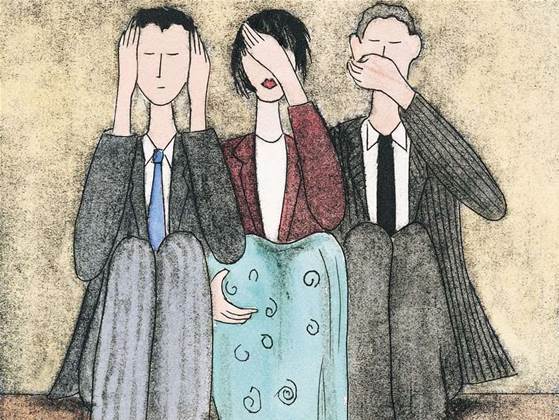But Alana Maurushat, UNSW Law researcher and international malware expert, was quick to disagree.
“You say the internet routes around censorship? Ballhooey,” she said. “It works in China, incredibly well.”
She spoke about the similarities and differences between Australia’s proposed internet filters and existing filters in other countries.
In the case of the UK, she said that only the three major ISPs were required to implement net filters. “Most people in the UK couldn’t tell you whether or not their ISP was filtered," said Maurushat.
Comparisons with China were wholly inaccurate, she said.
“The Chinese system has blacklists; they do deep packet inspection of peer-to-peer and encrypted material; and it costs billions of dollars to set up and maintain.
“Circumventing the system is even harder than it is here. For example, proxies are frequently written in English, so Chinese people have a language barrier.
“A lot of China’s censorship is self-censorship, because people know they can be arrested at any time in any place for doing something wrong.”
In China, when a person tries to access blocked material, they often receive a plain 404 error.
“But that’s the only indication that they’ve done something wrong. They never know whether they’re compliant or not.”
Colin Jacobs, Electronic Frontiers Association (EFA), said that his organisation had examined the ACMA’s reports on its existing blacklist of 1300 sites.
“A few sites had been added to the blacklist with a reason of ‘nudity’. Not pornography, just nudity."
“I think there’s certainly scope for abuse of the blacklist,” he told iTnews.
Jacobs told the conference that he often likened the role of ISPs to the postal service.
“The Post Office has no control over the content of the mail that it delivers. It just delivers. If you wanted to pass a law that said ‘I want to open every piece of mail and see if there’s child pornography inside’, then it’s obvious that it’s unworkable and ridiculous. That’s not what the Post Office does. It’s a delivery system. ISPs are the same.”
He predicted that if the government attempts to legislate internet filtering, ‘the technology will be out of date before the ink is dry’.
The content of the filters was also the subject of discussion.
Donna Ashelford, president of System Administrators Guild of Australia (SAGE_AU) which represents more than 1,000 sysadmins, said that she was concerned about the net filters 'because we’re the bunnies who have to implement it’.
She told the audience that in 2002, the EFA made a Freedom of Information application to see the Australian Communications and Media Authority (ACMA) blacklist, but before a determination could be made, the law was changed to prevent the list’s release.
Siva Sivasubramanian, a self-described technocrat who works at an ISP, described current filtering methods and explained why they would not work.
“There’s index-based filtering, based on the source criteria from the content. Like a blacklist: somebody has declared it as bad and therefore I’m not going to let it come through.
“There’s also content-based analysis, where we are not worried about the source but the content itself, and based on that we decide whether to filter or not filter.”
Sivasubramanian said that in combination, the two filtering methods could provide a decent solution – but there would always be ways around.
“Can the filters be effective? As effective as a window on your house. Any child can push and shove and break the glass, to get inside your house. Glass, like filters, will just keep the honest people out. Dishonest people will always be able to break in.
But the mood of the day was summed up by a sixteen-year-old student who addressed the conference about her experiences with web filters.
“I have been surfing the web for most of my school life, at school and home, with filters and without, and I have never accidentally stumbled upon pornographic material,” she said.
“We want education, not restriction.”





_(23).jpg&h=140&w=231&c=1&s=0)
_(28).jpg&h=140&w=231&c=1&s=0)





 iTnews Benchmark Awards 2026
iTnews Benchmark Awards 2026
 iTnews Executive Retreat - Security Leaders Edition
iTnews Executive Retreat - Security Leaders Edition
 iTnews Cloud Covered Breakfast Summit
iTnews Cloud Covered Breakfast Summit
 The 2026 iAwards
The 2026 iAwards












_(1).jpg&h=140&w=231&c=1&s=0)



